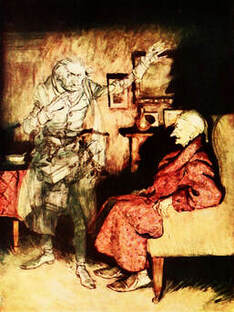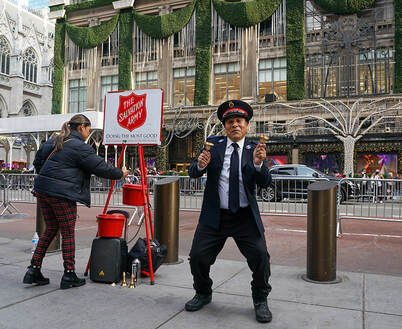 This month, when we spotlight the virtue of generosity, let’s also train eyes on generosity’s natural ally: hospitality. As families prepare to welcome relatives, friends, and strangers into their homes, we can help kids understand that the December holidays are not just a time to party, but a time to open our hearts and homes to the needs of others, to be a host and take joy in putting our guests first. AND let’s talk with kids about being good guests too. Hospitality, the friendly reception of guests or strangers into one’s home, has ancient roots. Early Bedouin peoples, who were always on the move, enshrined the virtue of hospitality in the Middle East. Offering shelter, water, finest food and drink, even music and stories to the traveling guest, was a feature of both ancient Sumerian and ancient Egyptian lore. Biblical sources repeat the theme. Ancient Greeks considered hospitality (philoxenia – “love of the stranger”) not just an option but a duty. In medieval times, Benedictine monks enshrined “hospitality” as one of their vows; they hastened to provide food and shelter to pilgrims on the move. So, as we deck out our homes, bake our cookies, put on the holiday music, and prepare to welcome guests, it’s a good time to remind ourselves and our children what it means to be a good host … and a good guest. When we extend hospitality, we are first and foremost thinking about the guest. We strive to create a welcoming space for the other. Our objective is to make guests feel appreciated and special. What should we teach kids about how to do that? It starts with getting ready: we prepare by providing a clean and possibly festive space, an area in which our company will feel welcomed. Maybe that means tidying up a play space or setting the table in a special way. When guests arrive, in the northern hemisphere at this time of year, it involves offering to take their coats and perhaps a bench to sit on to remove their boots. Then it’s about welcoming them into our home, letting the guests go first, and making them comfortable in the space in which we plan to entertain. By custom we offer guests a special drink or snack to welcome them. Then it's about sharing—learning about their lives, telling our stories, pursuing a common activity, whether a meal, conversation, card game, carols or karaoke. If you’re dining together, guests often have a special seat at the table. We can teach kids to clear the places of the guests at the end of the meal. When the guests leave, help them gather their belongings and always thank them for coming. Are there rules for gracious guests? Yes, indeed. The host does not expect payback but can expect good manners. The good guest gratefully accepts the hospitality offered and doesn’t ask for something different unless a physical allergy is involved (and then with apologies). The good guest always finds a way to express appreciation to the host for the meal or party or entertainment they’ve provided. And the good guest participates in events with gusto, responding eagerly to overtures of conversation and activity, contributing from their interests and experience. “Sharing” is not just about the host inquiring into the life and activities and needs of the newly arrived, but also about the guest seeking to better understand his/her hosts and contribute to a convivial environment with their own stories. Good guests leave the home of the host in good order (unless the host doesn’t really want them to help with dishes, which is common), and with many expressions of gratitude. In December, teachers can role play these situations with their class, having half the class be “guests” for lunch one day, and the other half act as “hosts.” Then switch it the next day. Who’s taking the coats? Who’ll show the guest to their seats? Who’ll serve the drinks and meal? How should the guests express appreciation? The class can also brainstorm how they can help their parents with the entertaining they are about to do: tidying the house, putting up the decorations, setting the table, putting guest towels in the guest bathroom, and much more. In Genesis, Abraham rushes out to meet three strangers who approach his tent and offers them hospitality. The ancient Jewish patriarch turns out to be "entertaining angels unaware" and is blessed by them. In our lives, when we discover the joy of opening our hearts and home to others and when we express gratitude toward those who honor us with their hospitality, the holidays come to life in a new way. Mary Beth Klee To read more from Telling Our Stories, visit our Blog Archives page. We feature Charles Dickens this month as our hero, as he (and his writing) model generosity of spirit and charity. To accompany him, we reprint here an earlier December blog because these thoughts are timely, if not timeless.  When the Ghost of Jacob Marley appeared to Scrooge on that eerie Christmas Eve, the frightened miser noted that he could see right through him, from his waistcoat to his back – he “had no bowels.” What? The contemporary reader comes to a full stop at that line, but in the nineteenth century the meaning was clear: bowels were the organ associated with compassion and empathy. Much as we would use “heart” today. And in his three spectral journeys, Scrooge travels through the bowels of time to sharpen his vision of Christmas Past, Present and Future, and to grow in love for those in need. Charles Dickens’ nineteenth century classic A Christmas Carol remains an admonition to stay alert to the plight of fellow travelers on the road of life. It is ever useful because then as now, we tend to wear social blinders or get stuck in our lanes. Depending on our neighborhood or profession, those in need may be nearly invisible to us. We may see right through them – or past them. Just as those original Christmas travelers, Mary and Joseph, were invisible to the innkeepers who had a full house. In this season when we try to sharpen our vision and fortify our bowels, let’s consider assisting some of the literal travelers on the road of life: Ukrainian and Afghani refugees. Since Russia's invasion of the Ukraine and since our own country’s withdrawal from Afghanistan, thousands have fled and sought refuge here and abroad. More than 368,000 Ukrainians are fleeing to the west, entering Romania, Poland, and Moldova. Last year, more than eleven thousand Afghanis fled their Taliban-dominated home, and came to the US. In both cases, refugees been helped by the work of Dorcas International, a nonsectarian outreach group, which has dedicated itself to refugee resettlement, and making a home for the stranger. Groups like Dorcas International try to position these legally admitted newcomers for success in their new homeland. With both a professional staff and LOTS of volunteers, they arrange for apartments, for English language classes, for vocational training in carpentry and the trades, enrollment of children in schools, and family assistance with grocery shopping, as the newcomers get their feet on the ground. The needs are immense, but the folks from Dorcas and many other non-profit and church groups are there to welcome the “poor, tired, and hungry yearning to breathe free.”  But what about the poor, tired, and hungry who are here on our own shores already? The everyday Americans, who often, because of bad fortune or drug addiction or alcohol or mental illness or domestic abuse have lost their way and are on the streets? We cannot walk through our cities without being aware of the homeless: folks with their carts and their pets, with a pleading sign, and a hand extended. Nearly half a million of our fellow countrymen are homeless. On the Core Virtues site, we’ve featured the slender middle school novel Stay (by Bobby Pyron), which shines a light on those who live in Emergency Shelters and/or public parks. And we feature some moving picture books as well. When addressing the problem of homelessness, there are state and federal initiatives to be sure, but the national tradition of voluntarism and what used to be called “benevolent institutions” is still active and a way to extend a hand. This is the time of year to support the work of non-profit, non-partisan groups like the National Alliance to End Homelessness and the Salvation Army. Our personal contributions and turning the attention of our students to those these groups serve is a way to keep the spirit of the holidays. The holidays are a time “when Want is keenly felt and Abundance rejoices,” two bell ringers tell Scrooge. His “bah-humbug” echoes in our ears. But the miser became a changed man following that Christmas Eve journey, and it was always said “that he knew how to keep Christmas well.” May we too know how to keep the spirit of the holidays well even beyond the holidays. To read more from Telling Our Stories, visit our Blog Archives page. |
AuthorWrite something about yourself. No need to be fancy, just an overview. Archives
July 2024
Categories |
